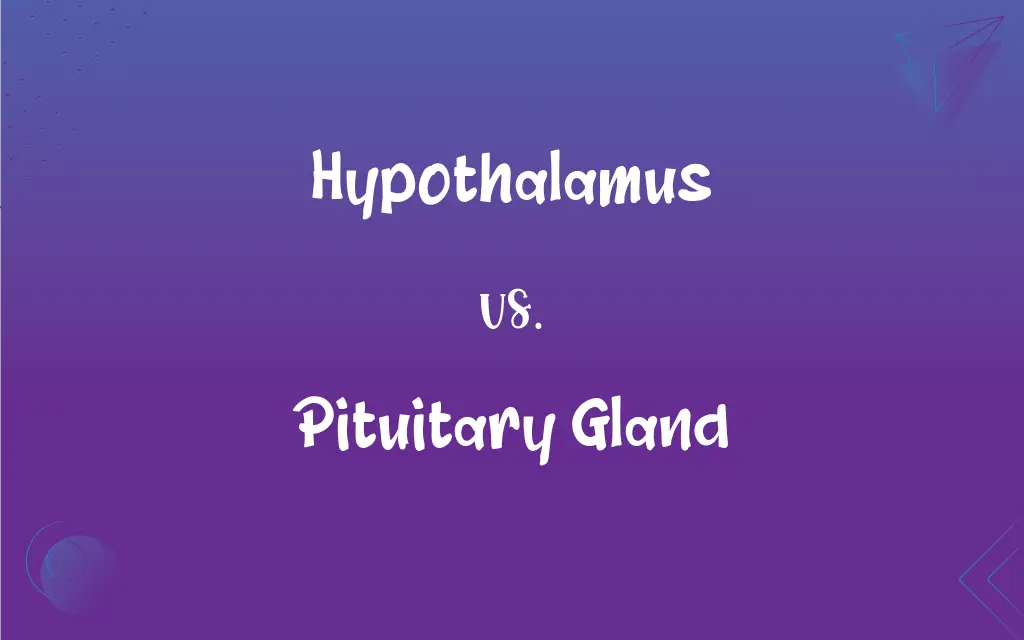Hypothalamus vs. Pituitary Gland: What's the Difference?
Edited by Aimie Carlson || By Janet White || Published on March 8, 2024
The hypothalamus is a region of the brain that regulates bodily functions and hormones, while the pituitary gland is an endocrine gland that produces and releases hormones under the regulation of the hypothalamus.

Key Differences
The hypothalamus and the pituitary gland are both crucial components of the endocrine system, but they have distinct roles and functions. The hypothalamus is a small region of the brain located below the thalamus and above the brainstem. It serves as a link between the nervous system and the endocrine system, playing a key role in maintaining homeostasis by regulating various bodily functions such as temperature, hunger, thirst, sleep, and emotions. The pituitary gland, also known as the hypophysis, is a pea-sized gland located at the base of the brain, just below the hypothalamus. It is often referred to as the "master gland" because it produces and releases a variety of hormones that regulate other endocrine glands and various physiological processes, including growth, metabolism, reproduction, and stress response.
One of the key differences between the hypothalamus and the pituitary gland is their location and structure. The hypothalamus is a part of the brain, while the pituitary gland is a separate endocrine gland connected to the hypothalamus by a thin stalk called the infundibulum. The hypothalamus communicates with the pituitary gland through this stalk, sending hormonal signals that regulate the gland's activity.
Another important distinction is their function in hormone regulation. The hypothalamus produces hormones that either stimulate or inhibit the release of hormones from the anterior pituitary. For example, the hypothalamus releases thyrotropin-releasing hormone (TRH) to stimulate the release of thyroid-stimulating hormone (TSH) from the anterior pituitary, which in turn regulates the thyroid gland. The posterior pituitary, on the other hand, stores and releases hormones produced by the hypothalamus, such as oxytocin and vasopressin.
The hypothalamus and pituitary gland work together to regulate various physiological processes through the production and release of hormones. The hypothalamus acts as a control center, integrating signals from the nervous system and regulating the activity of the pituitary gland, while the pituitary gland serves as the central hub for hormone production and secretion, influencing the function of other endocrine glands and tissues in the body.
Comparison Chart
Location
Below the thalamus, above the brainstem
At the base of the brain, below the hypothalamus
ADVERTISEMENT
Structure
Part of the brain
Separate endocrine gland
Function
Regulates bodily functions, links nervous and endocrine systems
Produces and releases hormones, regulates other endocrine glands
Hormonal Regulation
Produces releasing and inhibiting hormones
Produces and releases a variety of hormones
Communication
Sends hormonal signals to the pituitary gland
Receives signals from the hypothalamus
Hypothalamus and Pituitary Gland Definitions
Hypothalamus
Involved in emotional and behavioral responses.
The hypothalamus influences emotions such as fear and pleasure.
ADVERTISEMENT
Pituitary Gland
Known as the "master gland" of the endocrine system.
The pituitary gland controls the function of other endocrine glands in the body.
Hypothalamus
A key player in the regulation of hunger, thirst, and temperature.
The hypothalamus detects changes in body temperature and initiates appropriate responses.
Pituitary Gland
Involved in various physiological processes, including growth and reproduction.
The pituitary gland releases luteinizing hormone, which is important for reproductive function.
Hypothalamus
The control center for the endocrine system.
The hypothalamus controls the release of hormones from the pituitary gland.
Pituitary Gland
Consists of the anterior and posterior lobes with different hormone functions.
The anterior pituitary produces thyroid-stimulating hormone, while the posterior pituitary releases oxytocin.
Hypothalamus
A brain region that regulates bodily functions and hormones.
The hypothalamus plays a crucial role in maintaining the body's internal balance.
Pituitary Gland
An endocrine gland that produces and releases hormones.
The pituitary gland secretes growth hormone, which regulates body growth.
Hypothalamus
Integrates signals from the nervous system to the endocrine system.
The hypothalamus receives neural inputs and translates them into hormonal signals.
Pituitary Gland
Regulated by the hypothalamus through hormonal signals.
The hypothalamus sends signals to the pituitary gland to regulate hormone release.
Hypothalamus
The part of the brain that lies below the thalamus, forming the major portion of the ventral region of the diencephalon and functioning to regulate bodily temperature, certain metabolic processes, and other autonomic activities.
Hypothalamus
(anatomy) A region of the forebrain located below the thalamus, forming the basal portion of the diencephalon, and functioning to regulate body temperature, some metabolic processes and governing the autonomic nervous system.
Hypothalamus
A basal part of the diencephalon governing autonomic nervous system
FAQs
What are the main functions of the hypothalamus?
The hypothalamus regulates hunger, thirst, body temperature, sleep, emotions, and the release of hormones from the pituitary gland.
What is the pituitary gland?
The pituitary gland is an endocrine gland located at the base of the brain, known as the "master gland" because it produces and releases hormones that regulate other endocrine glands.
How do the hypothalamus and pituitary gland interact?
The hypothalamus sends hormonal signals to the pituitary gland, regulating its hormone production and release, which in turn influences various physiological processes.
What hormones are produced by the hypothalamus?
The hypothalamus produces releasing and inhibiting hormones, such as thyrotropin-releasing hormone (TRH) and growth hormone-releasing hormone (GHRH), which regulate the release of hormones from the pituitary gland.
How does the hypothalamus regulate body temperature?
The hypothalamus detects changes in body temperature and initiates responses to maintain a stable internal temperature, such as sweating to cool down or shivering to generate heat.
How does the hypothalamus regulate hunger and thirst?
The hypothalamus contains centers that detect nutrient and hydration levels, triggering hunger or thirst signals to maintain energy and water balance.
How does the hypothalamus influence sleep?
The hypothalamus regulates sleep-wake cycles by controlling the release of sleep-inducing hormones and responding to light-dark signals from the environment.
What is the hypothalamus?
The hypothalamus is a region of the brain that regulates bodily functions and hormones, acting as a link between the nervous system and the endocrine system.
What are the main functions of the pituitary gland?
The pituitary gland produces and releases hormones that regulate growth, metabolism, reproduction, and stress response, among other functions.
What is the role of the hypothalamus in the stress response?
The hypothalamus activates the stress response by releasing corticotropin-releasing hormone (CRH), which stimulates the pituitary gland to release ACTH, leading to the production of cortisol by the adrenal glands.
What is the significance of the anterior and posterior pituitary?
The anterior pituitary produces and releases its own hormones, while the posterior pituitary stores and releases hormones produced by the hypothalamus, such as oxytocin and vasopressin.
What is the role of the pituitary gland in reproduction?
The pituitary gland releases hormones such as luteinizing hormone (LH) and follicle-stimulating hormone (FSH), which regulate reproductive processes in both males and females.
What hormones are produced by the pituitary gland?
The pituitary gland produces hormones such as growth hormone (GH), thyroid-stimulating hormone (TSH), and adrenocorticotropic hormone (ACTH), among others.
What are some common disorders related to pituitary gland dysfunction?
Disorders related to pituitary gland dysfunction include acromegaly, Cushing's disease, hypopituitarism, and pituitary tumors.
How is the hypothalamus involved in emotional regulation?
The hypothalamus is part of the limbic system, which is involved in emotional responses, and it influences emotions through its interactions with other brain regions and hormonal regulation.
What is the impact of hypothalamic dysfunction?
Dysfunction in the hypothalamus can lead to various disorders, including hormonal imbalances, sleep disturbances, temperature regulation issues, and appetite changes.
What is the role of the pituitary gland in the body's water balance?
The pituitary gland releases vasopressin, also known as antidiuretic hormone (ADH), which regulates water retention in the kidneys and helps maintain the body's fluid balance.
How does the pituitary gland influence growth?
The pituitary gland releases growth hormone (GH), which stimulates growth in bones and tissues, playing a crucial role in physical development.
Can the pituitary gland be affected by tumors?
Yes, the pituitary gland can develop benign tumors called pituitary adenomas, which can impact hormone production and lead to various symptoms.
How does the hypothalamus respond to stress?
In response to stress, the hypothalamus activates the hypothalamic-pituitary-adrenal (HPA) axis, leading to the release of stress hormones and the activation of the body's stress response.
About Author
Written by
Janet WhiteJanet White has been an esteemed writer and blogger for Difference Wiki. Holding a Master's degree in Science and Medical Journalism from the prestigious Boston University, she has consistently demonstrated her expertise and passion for her field. When she's not immersed in her work, Janet relishes her time exercising, delving into a good book, and cherishing moments with friends and family.
Edited by
Aimie CarlsonAimie Carlson, holding a master's degree in English literature, is a fervent English language enthusiast. She lends her writing talents to Difference Wiki, a prominent website that specializes in comparisons, offering readers insightful analyses that both captivate and inform.































































